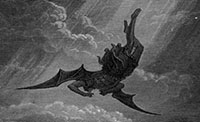Lucifer
[From the Latin, meaning “light-bearer.”] One who attained to the rank of archangel and fell from grace through pride, ambition, and the desire to be above the Stars of God (Sons of God and Elohim), above the Shekinah glory to rival the Most High. “How art thou fallen from heaven, O Lucifer, son of the morning!...”[1]


False Hierarchy
Archetype of the planetary dweller-on-the-threshold.
The fallen angels
Isaiah 14:12–17 provides the scriptural account of Lucifer’s declaration of war against Almighty God and his Christ:
How art thou fallen from heaven, O Lucifer, son of the morning! how art thou cut down to the ground, which didst weaken the nations!
For thou hast said in thine heart, I will ascend into heaven, I will exalt my throne above the stars of God: I will sit also upon the mount of the congregation, in the sides of the north:
I will ascend above the heights of the clouds; I will be like the most High.
Yet thou shalt be brought down to hell, to the sides of the pit.
They that see thee shall narrowly look upon thee, and consider thee, saying, Is this the man that made the earth to tremble, that did shake kingdoms;
That made the world as a wilderness, and destroyed the cities thereof; that opened not the house of his prisoners?
Sanat Kumara speaks of the angels that followed Lucifer in the Great Rebellion:
In the Great Rebellion against the LORD God Almighty and the hosts of his heavenly Hierarchy, Lucifer seduced no small number of angelic bands led by his cohorts. Their names are mentioned in the Book of Enoch, and in other books of the Apocrypha, and in the codified scriptures of East and West.
More notable are the names Satan, Beelzebub, Belial, Baal, etc. One such name, that of the more shrewd and subtil leader of a band of fallen ones, has come to be lowercased in the lexicon of sacred scripture, and it has taken on a symbolic rather than personal connotation. It is that of Serpent.
Whereas the term “great dragon” refers to the conglomerate of the entire Luciferian false hierarchy arrayed against the Great White Brotherhood, its individual members and hierarchs specialize in certain phases of the “dragon’s” persecution of the Woman and in the war waged by the Luciferian false hierarchy against the remnant of the Woman’s seed.
Whereas Satan is known as the original Murderer using the murder of the lightbearers to thwart the divine plan of God in the earth, Serpent, who is also “called the Devil and Satan,” is the Archdeceiver, the original Liar and the father of lies whose philosophy of deception, based on fear and doubt, is his modus operandi in his warfare against the true Christs and the true prophets.
Serpent is the Wicked One whose seed, along with Satan’s, is sown as tares among the good wheat of the Christic seed. It is this seed who are called the offspring of the vipers. “Viper” is from the Greek translation of the proper name “Serpent,” who, together with the fallen ones of his band, was cast out of heaven and took embodiment on earth where they have continued to reincarnate since the Great Rebellion.[2]
The angels who followed this archdeceiver, named by Jesus “the father of lies” and “a murderer from the beginning,”[3] are the fallen ones, also called Luciferians, Satanists or sons of Belial (after their various lieutenants). More than disobedient, these rebels against First Cause were blasphemous and contemptuous of the Father and his children amongst whom they embodied (see the parable of the tares among the wheat, Matt. 13), having been brought low—to the lowly estate of physical incarnation—by the LORD’s hosts.
The final judgment of Lucifer
Lucifer was bound “on earth” by Michael the Archangel on April 16, 1975 (even as he and his angels had been bound “in heaven” by the same Defender of the Faith and his angels) and taken to the Court of the Sacred Fire on Sirius, where he stood trial before the Four and Twenty Elders over a period of ten days. The testimony of many souls of light in embodiment on Terra and other planets and systems were heard, together with that of the ascended masters, archangels, and Elohim.
On April 26, 1975, he was found guilty of total rebellion against Almighty God by the unanimous vote of the Twenty Four and sentenced to the second death. As he stood on the disc of the sacred fire before the court, the flame of Alpha and Omega rose as a spiral of intense white light, canceling out an identity and a consciousness that had influenced the fall of one third of the angels of the galaxies and countless lifewaves evolving in this and other systems of worlds.
Many who followed the Fallen One in the Great Rebellion against the Son of God have also been brought to trial. His seed, still “wroth with the Woman” and her Manchild, are making war with the heirs of Sanat Kumara’s light on planet earth.[4] Daily they are being bound by Archangel Michael and the Lord’s hosts and remanded to stand trial in the final judgment as one by one their time is up—and they are being judged: “every man according to their works,” as Jesus’ angel showed it in a vision of the last days of the Piscean age to John the Revelator.
See also
For more information
Elizabeth Clare Prophet, Fallen Angels and the Origins of Evil
See also Jesus’ parable of the tares and the wheat (Matt. 13:24–30, 36–43).
Sources
Mark L. Prophet and Elizabeth Clare Prophet, Saint Germain On Alchemy: Formulas for Self-Transformation.
Archangel Gabriel, Mysteries of the Holy Grail.
- ↑ Isa. 14:12.
- ↑ Elizabeth Clare Prophet, The Opening of the Seventh Seal: Sanat Kumara on the Path of the Ruby Ray, chapter 33.
- ↑ John 8:44.
- ↑ See Rev. 12.
